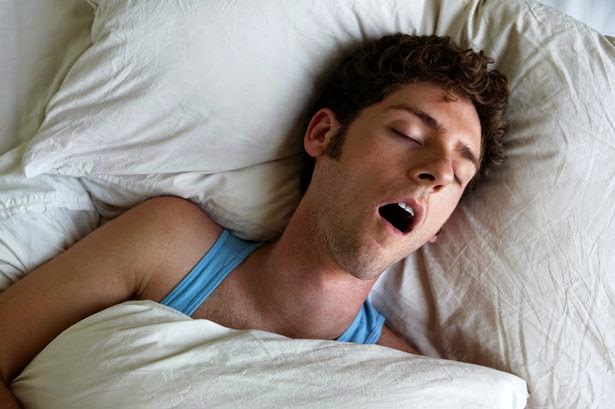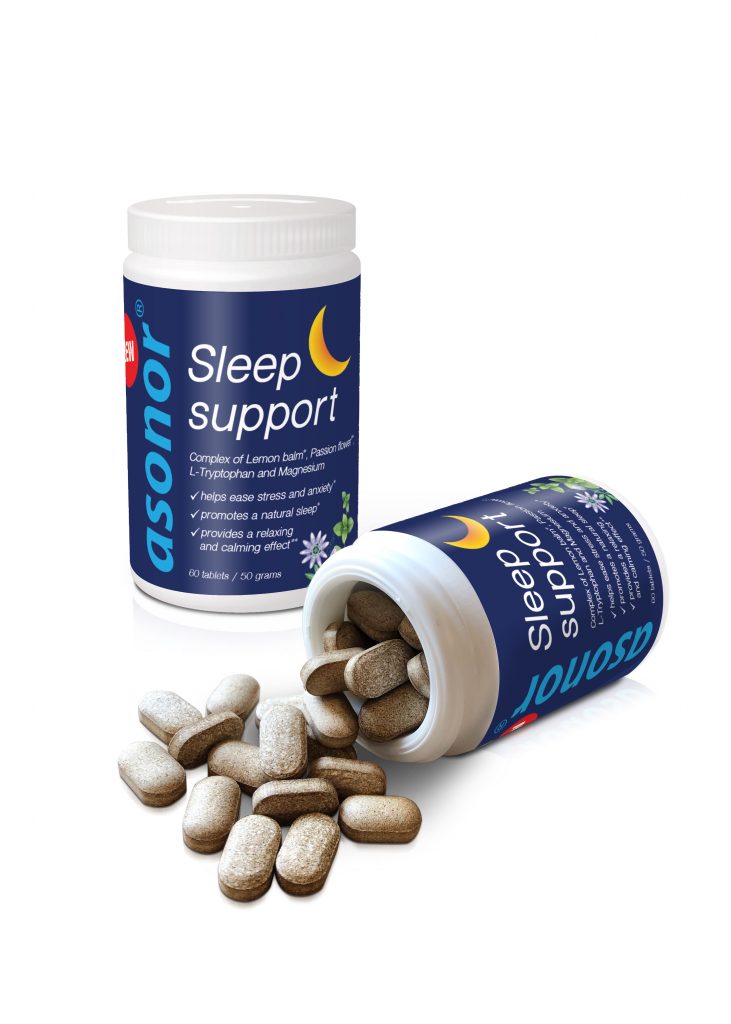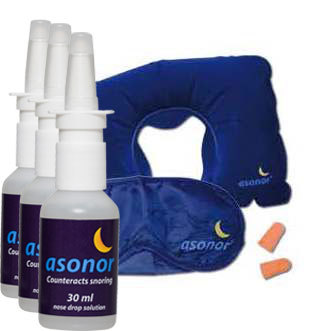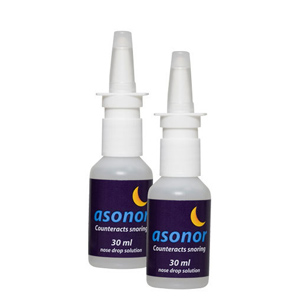Although it is frequently treated as something comical or a joke in movies and on TV, having a significant other or spouse that snores on a regular basis can have an adverse effect on a relationship. It’s almost like sleeping a few inches away from a chainsaw and can drastically affect the health of the snorer and his or her partner as well as their sleeping patterns. Finding an effective anti snoring solution or anti-snoring device to counteract the problem could save a relationship that’s in trouble.
What is Snoring?
Snoring is the harsh or hoarse sound that occurs when airflow is obstructed or restricted and unable to pass freely through the mouth or nasal passages. When air is forced through an area that is obstructed or partially blocked, it causes the soft tissues of the mouth, nose, and throat to bump against each other, thereby causing them to vibrate and make a grumbling, rattling, or snorting sound. Fortunately, there is a broad range of anti-snoring products available OTC and by prescription.

Many individuals have asked if snoring is dangerous or harmful. In most cases, this will depend on the frequency, severity, and type of snoring that occurs. For example:
- Infrequent, Light Snoring is fairly normal among a large percentage of individuals and usually doesn’t require any type or medical testing or treatment by a physician, sleep therapist, or other healthcare professional.
- Primary Snoring is snoring that occurs 3 or more nights during the week and can be a disruption to your partner or spouse. However, primary snoring isn’t considered a health threat unless there are symptoms of a more serious underlying condition such as obstructive sleep apnea.
- Sleep Apnea Associated Snoring is often seen as a health issue as it adversely affects your quality of sleep and overall well-being. If you or your partner is worried that your snoring is attributed to sleep apnea, you should probably see a sleep therapist or specialist.
In most cases, snoring isn’t considered to be a health threat. However, if you and your partner or spouse has concerns about your snoring, you should speak with a doctor or healthcare professional that specializes in sleep disorders and snoring issues.
When searching for the best anti-snoring device, it’s important to establish what category or type of snorer you are. In the majority of all snoring cases studied, the way a person snores usually indicates why they snore. If there is an obstruction or partial blockage in the upper airway, air is unable to pass freely through the nose and throat. As a result, you snore. Based on what is causing your airway to close or narrow, there are 4 categories of snoring:
- Mouth Snoring results when you breathe through your mouth rather than your nose while you sleep. The may be caused by a blockage in the nasal passages, enlarged tonsils, or weak palate tissues.
- Nose Snoring often results from a deviated septum or some form of obstruction that blocks the airway and causes snoring. Other causes may include colds, dust and pet allergies; medications; and stiffness of the nasal passages.
- Throat Snoring is not only the loudest type of snoring, it is often considered the most dangerous. In most cases, this type of snoring is associated with or linked to sleep apnea. If ignored or left untreated, throat snoring can lead to a number of health issues including diabetes, hypertension, and stroke.
- Tongue Snoring – people who sleep on their back suffer with this type of snoring. This type of snoring results when the tongue gets overly relaxed, falls back into the throat, and blocks the airflow. People who enjoy drinking alcohol or use sleep medications are prone to tongue snoring.
It’s important to keep this information in mind when shopping for an anti-snoring device or anti-snoring product. Furthermore, If you snore when sleeping at night, this is a good indication that you probably aren’t getting the quality sleep that you need.
Types of Anti Snoring Devices
Finding the best anti-snoring device for your particular situation can be a challenging task as there are dozens to choose from including mouthpieces, nasal strips, oral appliances, and even pillows that all claim to stop snoring. At best, these anti-snoring devices can reduce the frequency of snoring. But whether or not they can completely eliminate may be another story, especially if there is a more serious underlying issue that is causing you to snore such as a disorder like Obstructive Sleep Apnea (OSA).
The following is a list of different anti-snoring devices that have been fairly effective at relieving snoring problems for some individuals:
- Breathe Right Nasal Strips – the underside of these “strips”contain an adhesive that sticks to the nose just above the flares of both nostrils. As the bands in the strip return to their original shape, it lifts the sides of the nostrils and opens the passages.
- SleepTight Mouthpiece – This combination anti-snoring device pulls the tongue forward by repositioning the jaw to help reduce snoring. It has a 6mm airway in the front for individuals who are mouth snorers and breathe through their mouths.
- Anti Snoring Mouthguards – these anti-snoring devices were designed to move the lower jaw forward and keep your airway open while you sleep. When the airflow is left unrestricted, it reduces tissue vibrations and promotes a better night’s rest.
- Side sleepers Pillows – these pillows are designed to accommodate sleeping on your side and keeping you from trying to sleep on your back. These are thicker than regular pillows and fill the space beneath the neck and head while keeping the spine in perfect alignment.
When searching for anti-snoring products or the best anti-snoring device, it’s important to research your options. In most cases, the best anti-snoring device or product will be the one that is designed for your type of snoring (i.e. mouth snoring, nose snoring, etc.).
What is the Expert’s View of Anti-snoring Devices?
Most sleep experts agree that a stop snoring product must do 3 things before it can truly be labeled as the best anti-snoring device or product including:
- It must stop your snoring or reduce it to such an extent that it’s no longer noticeable.
- It will be the best value for the money.
- It will create the least amount of side-effects while helping you breathe and sleep at the same time.
What’s important to remember is that no single anti-snoring device or product works for everybody. In other words, there’s no one-size-fits-all solution for snoring. Since no two individuals are alike, neither is the type of snoring they do nor the type of anti-snoring product that works best for each one.
So why should you try an OTC anti-snoring product or one of the many anti-snoring devices available on the market today? First of all, it’s a cheaper way to determine if you can finally get relief from your snoring. Second, it will mean you’ve found the best anti-snoring device for your particular situation.
What to Look for in an Anti Snoring Device
There are so many options available for snorers in the marketplace today that it can often be extremely difficult to know which one is going to work for you. If you don’t know what to look for in this vast assortment of stop snoring products, it can be a real gamble and you could wind up choosing one that’s not effective. There are 3 factors that you want to take into consideration when comparing all the different anti-snoring devices including the following:
- Product Types – when shopping for an effective anti-snoring device, you’ll quickly discover that there is an extensive range of products to choose from including
- anti-snore pillows
- chin straps
- CPAP machines
- mouthguards
- nasal dilators
- nasal sprays
- nose strips
- tongue retainers
When choosing from these different product categories, be sure you consider factors such as comfort, cost, customer feedback/reviews, and transportability.
- Product Warnings – most of the products listed above come with instructions regarding how to use them. Many of them may have also certain warnings attached to their usage instructions as well. A good example would be the nasal sprays that are available. Be cautious about their ingredients as some should not be used on a regular basis because they could cause dependency. Always read the label on any anti-snoring product.
- Reusability – this is another important factor to consider as some of these products aren’t reusable (e.g. nose strips) while others (e.g. chin straps, CPAP machines, mouthguards, and nasal dilators) can be reused. However, they will require frequent cleanings for obvious reasons.
By taking these factors into consideration along with the type of snorer that you are, it will help you navigate through the myriad of products out there and hopefully find the one that works best for you.
Conclusion
Choosing the best anti-snoring device can be a daunting, frustrating task. You may have to go through several options before finding the one that accommodates your specific needs. Furthermore, the less invasive devices and products tend to work better because of their adaptability and comfort level. For additional information, visit the Asonor website or e-mail us by clicking here.
Also Read- Best Anti Snoring Product and Devices on the Market Today







